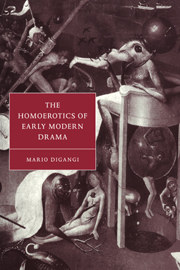Book contents
- Frontmatter
- Contents
- Preface
- 1 Introduction
- 2 The homoerotics of marriage in Ovidian comedy
- 3 The homoerotics of mastery in satiric comedy
- 4 The homoerotics of favoritism in tragedy
- 5 The homoerotics of masculinity in tragicomedy
- Notes
- Bibliography
- Index
- Cambridge Studies in Renaissance Literature and Culture
1 - Introduction
Published online by Cambridge University Press: 02 December 2009
- Frontmatter
- Contents
- Preface
- 1 Introduction
- 2 The homoerotics of marriage in Ovidian comedy
- 3 The homoerotics of mastery in satiric comedy
- 4 The homoerotics of favoritism in tragedy
- 5 The homoerotics of masculinity in tragicomedy
- Notes
- Bibliography
- Index
- Cambridge Studies in Renaissance Literature and Culture
Summary
Homosexuality/homoeroticism
Examining the homoerotics of early modern drama offers the chance to grapple with relatively neglected issues and texts in Renaissance scholarship. Paradoxically, whatever innovation I have to contribute to Renaissance studies is based on a commonplace in lesbian and gay studies: “homosexuality” is a modern concept that cannot be applied, without a great deal of historical distortion, to the early modern period. Presented with admirable economy and clarity in Alan Bray's groundbreaking book Homosexuality in Renaissance England (1982), this key thesis has received intense scrutiny from historians and cultural critics alike. While some scholars have produced nuanced qualifications and elaborations of Bray's findings, others have responded with more anxiety to the implication that there were “no homosexuals” in the Renaissance. The increasing volume and complexity of the debate over the past five years makes this an appropriate time to take account of the current state of lesbian and gay scholarship on early modern England. At the risk of retracing some familiar territory, then, I want first to map out some important critical positions and offer, from my own vantage point, an assessment of their value to an historical analysis of early modern culture. Establishing the current parameters of the field will also establish a genealogy and a context for my subsequent engagement with the particular issues informing the homoerotics of early modern drama.
- Type
- Chapter
- Information
- The Homoerotics of Early Modern Drama , pp. 1 - 28Publisher: Cambridge University PressPrint publication year: 1997



